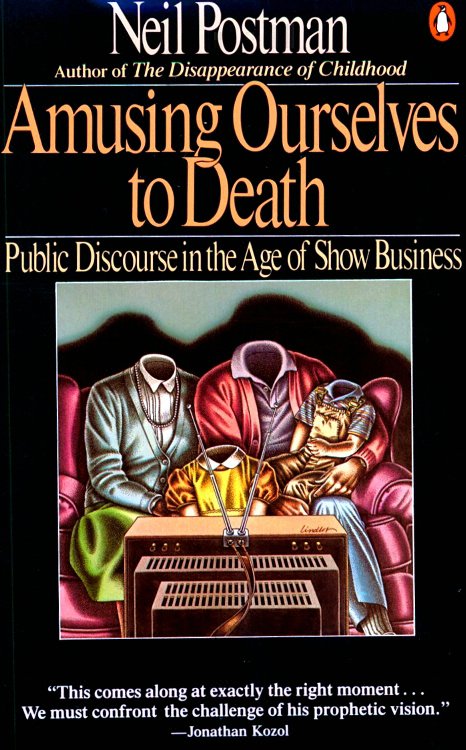Book Notes
 Neil Postman, Amusing Ourselves to Death; Public Discourse in the Age of Show Business (New York: Penguin Books, 1985).
Neil Postman, Amusing Ourselves to Death; Public Discourse in the Age of Show Business (New York: Penguin Books, 1985).
A while back I was exiting an airplane after an international flight on a 747, and as I walked down the aisle I took a long look at about 300 small televisions embedded into the seatbacks of every single seat. This, I thought, was a graphic metaphor of the all-pervasive power and presence of media in our lives. Neil Postman's classic work is one of my all time favorite books, and now it nears its twentieth anniversary. Its cover shows a family of four seated on a sofa and watching television. When you look closely, you see that the artist has depicted them with no heads.
Postman's book is about far more than television, but consider these insidious statistics (compiled by TV-Free America):
* Number of TV sets in the average U.S. household: 2.24
* Percentage of U.S. homes with three or more TV sets: 66
* Number of hours per day that TV is on in an average U.S. home: 6 hours, 47 minutes
* Number of minutes per week that parents spend in meaningful conversation with their children: 3.5
* Number of minutes per week that the average child watches television: 1,680
* Hours per year the average American youth spends in school: 900 hours
* Hours per year the average American youth watches television: 1500
* Number of murders seen on TV by the time an average child finishes elementary school: 8,000
* Number of violent acts seen on TV by age 18: 200,000
* Number of 30-second TV commercials seen in a year by an average child: 20,000
* Number of TV commercials seen by the average person by age 65: 2 million
The contemporaries George Orwell (1903–1950) and Aldous Huxley (1899–1963) both warned of the death of culture, but in very different ways. In his book 1984 (1949) Orwell warned of external oppressors, whereas in Brave New World (1932) Huxley warned that we would not only choose but love our own poison. Orwell warned about totalitarians who would ban books; Huxley warned about the day no one could care to read a book. Orwell feared those who would inflict pain and torture, Huxley those who would enslave us with pleasure and distractions. "In short," writes Postman, "Orwell feared that what we hate will ruin us. Huxley feared that what we love will ruin us. This book is about the possibility that Huxley, not Orwell, was right" (p. viii).


